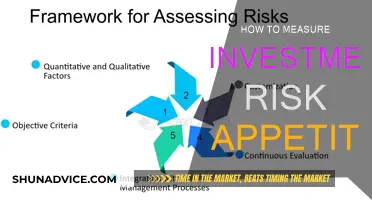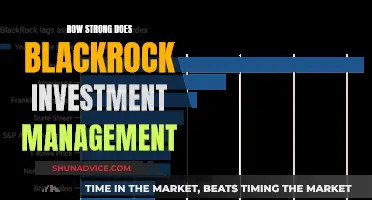
There are several safe investment options for those looking to grow their money while minimising risk. These include money market funds, treasury securities, high-yield savings accounts, certificates of deposit, and cash management accounts.
Money market funds are mutual funds that invest in short-term, low-risk assets like treasury and government securities, commercial paper, or municipal debt. They offer diversification and liquidity but may not be protected by the FDIC or NCUA. Treasury securities are backed by the US government and come in three types: bills, notes, and bonds. Bills mature in one year or less, notes span up to 10 years, and bonds mature in 20 to 30 years.
High-yield savings accounts are also considered safe as they are FDIC-insured (up to $250,000) and offer easy access to funds. Certificates of deposit (CDs) are offered by banks and provide reliable, fixed-rate returns over a fixed period. They are FDIC-insured but usually incur a penalty if you withdraw your money early.
Lastly, cash management accounts are offered by brokerages and can function as checking or savings accounts, often with competitive interest rates and no fees. While they may not be FDIC-insured, they are backed by partnerships with banks.
| Characteristics | Values |
|---|---|
| Returns | Low |
| Risk | Low |
| Liquidity | High |
| Volatility | Low |
| Accessibility | High |
| Safety | High |
| Diversification | High |
What You'll Learn

High-yield savings accounts
- High-yield savings accounts typically offer higher interest rates than traditional savings accounts, providing an opportunity to earn more on your savings.
- These accounts are usually offered by online banks or the online divisions of brick-and-mortar banks, taking advantage of lower overhead expenses to provide competitive rates.
- Your money is easily accessible, and you can withdraw or deposit funds at any time without penalties.
- Most high-yield savings accounts are federally insured by the FDIC or NCUA, ensuring your deposits are safe up to $250,000 per depositor.
- The interest rates on high-yield savings accounts are variable and can change at the bank's discretion or in response to broader economic factors.
- Some accounts have minimum balance requirements to earn the highest APY or to avoid monthly maintenance fees.
- Online high-yield savings accounts often provide digital tools for easy management through computer or mobile apps.
- While high-yield savings accounts offer higher interest rates, they may have restrictions on withdrawals, typically limited to six per month.
- Some high-yield savings accounts provide additional perks such as ATM cards or debit cards, while others may charge fees for certain transactions or paper statements.
- When choosing a high-yield savings account, consider the interest rate, minimum balance requirements, fees, accessibility, and customer service provided by the bank.
- The best high-yield savings accounts offer strong interest rates, good perks, and national accessibility.
Social Security Investment Strategies: Maximizing Your Savings
You may want to see also

Money market funds
There are three types of money market funds: government, municipal and prime. Government money market funds invest in government-backed assets, such as cash, short-term US government debt and repurchase agreements backed by government debt. Municipal money market funds invest in short-term municipal debt, and the income generated is exempt from federal income taxes. Prime money market funds invest in short-term corporate debt.
When choosing a money market fund, it's important to consider the yield, fees and expense ratios. It's also worth noting that not every money market fund is available in every brokerage account.
Strategic Equity Investment: A Comprehensive Guide
You may want to see also

Short-term certificates of deposit
CDs are available at banks, credit unions, and brokerages, and they usually offer higher interest rates than savings accounts. However, you lose withdrawal flexibility, and if you withdraw your funds early, you will be charged a penalty.
CDs come in various terms, ranging from 3-, 6-, or 12-month commitments to longer-term options of 4, 5, or even 10 years. When deciding on the term, consider your financial goals and how soon you will need access to the funds. If you are saving for a short-term goal, such as a vacation or a new car, a short-term CD may be a good option.
When choosing a CD, shop around and compare the interest rates, terms, and minimum deposit requirements offered by different financial institutions. Also, consider the early withdrawal penalties and whether the CD will be automatically reinvested at maturity. By law, CDs are required to be very low risk, but it's important to understand all the terms and conditions before investing.
Overall, short-term CDs can be a great option for those seeking a safe and conservative investment with relatively higher interest rates than savings accounts. They are ideal for those who don't need immediate access to their funds and are willing to commit to a fixed term to earn guaranteed returns.
A Smart Guide to Index Investing in India
You may want to see also

Government-backed investment schemes
Treasury Securities
Treasury securities, often referred to as Treasurys, include Treasury bills, notes, and bonds. They are considered one of the safest investments due to the backing of the US government. Treasury bills mature within a year or less, while Treasury notes have maturities of two and ten years, and Treasury bonds mature in 20 to 30 years. These securities offer stable and predictable returns, making them attractive for investors seeking safety during volatile market periods.
Treasury Inflation-Protected Securities (TIPS)
TIPS are a type of government bond that protects your investment from the impact of inflation. The principal value of TIPS adjusts with the rate of inflation, ensuring that your investment keeps up with rising prices. TIPS are sold with terms of five, ten, or 30 years, providing options for different investment horizons.
Series I Savings Bonds
Series I Savings Bonds, also known as I Bonds, are US government bonds designed to protect your investment from inflation. These bonds are indexed to inflation, ensuring that the interest rate adjusts based on the current rate of inflation. I Bonds have a fixed rate determined at the time of purchase and a maturity period of 30 years. They offer a safe and stable investment option, particularly during periods of high inflation.
Municipal Bonds
Municipal bonds are issued by local governments and are funded by tax collections or other government revenues. They offer tax-free income at the federal, state, and sometimes local levels, making them attractive to investors in higher tax brackets. While municipal bonds are considered low to moderate risk, it's important to note that they have a less active secondary market compared to other securities.
Annuities
Annuities are contracts made with insurance companies that provide a guaranteed level of income over a specified period or for life in exchange for an upfront payment. They offer a fixed and steady income stream, making them appealing for individuals seeking financial security during retirement. However, it's important to carefully review the complex terms and conditions of annuity contracts before investing.
Smart Saving and Investing Strategies for Your Kids' Future
You may want to see also

Dividend-paying stocks
Dividend stocks are considered a good choice for investors looking for passive income. The best dividend stocks are shares of well-established companies that increase their payouts over time. Dividend-paying stocks can also add stability to your portfolio.
Dividend stocks are shares of companies that pay investors a portion of the company's earnings. Some pay dividends annually, semi-annually, or quarterly, while others are monthly dividend stocks. The average dividend yield of some of the top dividend stocks is 12.69%.
Investing in dividend stocks can be done in two main ways: through funds (such as index funds or exchange-traded funds) that hold dividend stocks, or by purchasing individual dividend stocks.
When choosing a dividend-paying stock, it is important to evaluate the stock's payout ratio, which indicates how much of the company's income is going towards dividends. A payout ratio above 80% means the company is putting a large percentage of its income into paying dividends.
It is also important to note that dividends in taxable brokerage accounts are taxed in the year they occur, unlike stocks that do not pay dividends, where taxation occurs when the stock is sold.
- Pennymac Mortgage Investment Trust (PMT)
- AG Mortgage Investment Trust Inc (MITT)
- Franklin BSP Realty Trust Inc (FBRT)
- Seven Hills Realty Trust (SEVN)
- Verizon Communications Inc. (VZ)
- Altria Group Inc. (MO)
Savings, Investment, and Outflow: Understanding the Balance
You may want to see also
Frequently asked questions
Safe investments include high-yield savings accounts, money market funds, certificates of deposit (CDs), cash-value life insurance, and treasury securities.
Safe investments tend to have lower returns than riskier assets. Additionally, inflation can erode the purchasing power of low-risk investments over time.
Safe investments offer stability and capital preservation, making them ideal for investors who want to protect their money. They also provide predictable income and protection against market volatility.
When selecting safe investments, consider your financial goals, risk tolerance, investment horizon, and return expectations. Diversifying your portfolio across different types of safe investments can also help balance your portfolio and reduce overall risk.







